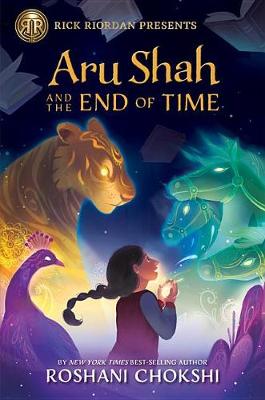Reviewed by sa090 on
I didn’t have a lot of expectations going into this after the disastrous experience I had with Magnus Chase and The Gods of Asgard series, and despite the different author this time around, I’m so glad that I never changed that expectation level.
───────────────────
Alright, so I never actually read anything by Roshani Chokshi before since despite the beautiful covers, her books (based on Synopsis ONLY) didn’t seem like books I’ll actually enjoy, so I thought this would be my way in to her writing. That being said, this book feels like it was written while Rick Riordan was sitting behind her overlooking what she’s writing and adding his own take on things while she moved the plot along. The unneeded jokes are all over the book and although they’re somewhat elevated when taking Rick’s own jokes in his other books into consideration, Aru Shah and the End of Time still feels like a rehashed version of Percy Jackson. Just like Magnus Chase’s series did, despite this one still being better than the Norse series.
I mean the writing was easy to follow, it was very easy to read and I liked the way she envisioned her part of his universe, but I wish that she went more in depth about some things. I don’t know about most, but most of the literature or rather entertainment I consume, has nothing to do with Indian Mythology so this is all new to me. Despite finishing it an hour ago, not all of the names have actually stuck around for me to remember at the top of my head, despite me remembering the way the majority “looked” like more easily. I do blame the ones I forgot on my lack of knowledge about Indian Mythology, but I also hoped that any new character will be a little more memorable. Now that I think a little bit more about it though, I think revisiting the world would surely jolt my memories, so it’s not that big of a deal assuming that I will go on to the sequels.
Now plot wise, I do think that this is going to be an enjoyable read to those who have never read any of Rick Riordan’s previous books because it will be something new, but to me personally I hoped for something a little different. I do have to give props to her for not making a total mockery of the deities though, she would definitely add some side comment here or there because of who was most likely overlooking her writing and the fact that it becomes easier to read for children that way, but she still presented most of them in a more respectful image than Rick did for the majority of his included deities. I know that I’m comparing between them a lot, but it’s very difficult to try and think that this was entirely her own thought process.
The main characters weren’t bad and they were also somewhat explored despite one of them having a very toxic thing going on for them which I’ll be focusing on below in the comments, but the fast paced book makes the more apparent focus to be on the action rather than really focusing on the characters, which is totally fine since action is surely going to be more gripping. And to her credit, Roshani Chokshi does take us through some pretty interesting scenarios while showcasing different areas of her world, different entities and shedding some very brief light on the different legends in the mythology, which I once again wish was more explored.
I won’t call it a bad book, because it really wasn’t. It was gripping enough for me to actually finish it without feeling bored, but with the abundance of very similarly written (and some better) books, it falls kind of short. I do have a couple of spoiler filled issues in the book though, so I’ll be leaving that for below. For now, it was just okay.
Final rating: 2/5
Reading updates
- Started reading
- 18 April, 2018: Finished reading
- 18 April, 2018: Reviewed
